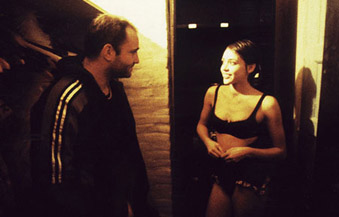Chapter Two
Pusher II
By Brett Ballard-Beach
October 13, 2011
More than either the first or third film, Pusher II begins with a mission statement of sorts, in a near monologue from a character that we never see again (Tonny’s cellmate) who establishes the nature of power in the criminal world, and succinctly proffers why Tonny will never be on the end delivering the beating. This five-minute sequence suggests a movie to follow that Refn can’t quite deliver on, but the power of the words, of the voice and demeanor of the actor playing the prisoner, of the air of stillness that seems stretched to break, allow it to settle like a cloud over what follows, an incantation of foreboding as much as a warning.
With his shaved head, whiter shade of pale skin and the word Respect tattooed forlornly on the back of his skull - an invisible question mark hanging at the end of the word in much the same way it does for his life at large - Tonny comes across as the saddest, least threatening screen skinhead ever. Even a brazen attempt at carjacking, in an attempt to impress his old man, provokes only derision as he steals a car that is too flashy, and one that could easily lead the police to the doorstep of The Duke’s auto theft ring.
Actor Mads Mikkelsen (already a star in Denmark, he would leap to more mainstream international renown as the villain in Casino Royale) has a far more difficult task than his fellow players Kim Bodnia (Frank) or Zlatko Buric (Milo) faced in their respective lead turns. Frank and Milo, as real as they feel, both have a slightly larger than life aspect to their character. They seem to belong at the center of a narrative with their magnetic yet enigmatic personalities. Tonny is the born sidekick, an extra in his own life with an inherent passivity even on the rare occasion when he succeeds in asserting himself. “All my lies are always wishes,” as the Wilco lyric goes, and those words are an apt encapsulation of Tonny’s spirit.
Continued:
1
2
3
4
|
|
|
|




